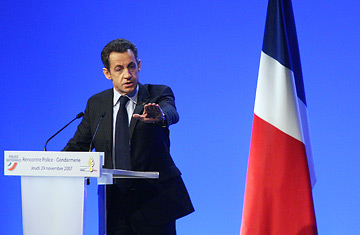
The economy pushes Sarkozy's score under the 50% bar.
In the end, it turned out to be something even more formidable than massive strikes, countless street protests, or even the explosion of violence in the nation's blighted housing projects that caused French President Nicolas Sarkozy's approval rating to sink. The reason for Sarkozy's score to slide under the 50% bar was the economy — and more precisely, the President's inability thus far to boost flagging purchasing power that French voters list aside unemployment as their biggest daily concern.
The latest polls by Le Figaro show Sarkozy's approval rating at 49% — a slide of four points over the previous month. It also constituted a drop of 16 points from his presidential high of 65% in July. Then, Sarkozy's actions impressed pundits and the public alike by pushing through a flurry of reforms into law — and staging diplomatic coups by brokering agreement on the simplified European Union treaty; freeing Bulgarian medics held by Libya; and laying the way for restored relations with the U.S. with his vacation chow-down with George W. Bush. But that razzle-dazzle has failed to achieve what French consumers are waiting for most: economic growth capable of cutting joblessness, and putting more disposable income into their pockets. With that not happening, 87% of respondents say the government has failed to battle rising prices; 73% say its efforts to lower unemployment haven't worked; and another 73% feel the economic outlook is getting worse.
"Until recently, Sarkozy succeeded in creating the impression that all he has to do is decide something for it to be a done deal," says Dominique Reynié, a political analyst and professor at the Foundation of Political Science in Paris. "Now people are seeing that all that grandstanding hasn't produced much in the way of concrete results, and they're changing their opinion on Sarkozy's effectiveness," he continues. "That's bound to accelerate given public anxiety over the economy — a very heavy, complex, slow-moving variable that doesn't respond to political sleights of hand."
That darkening public concern — and its role in lowering Sarkozy's approval numbers — was the main reason most observers expected the President to announce state handouts to boost purchasing in a nationally televised interview Thursday on TF1 and France 2. Instead, Sarkozy told the public that getting more money into consumer pockets would have to come from people working longer — and effectively renouncing the nation's 35-hour workweek. "Get To Work, And No Gifts" headlined the leftist daily Libération Friday. "The End of the 35-Hour Yoke" celebrated its conservative rival, Le Figaro.
With one of Sarkozy's earliest reforms having granted over $22 billion in income tax cuts (thereby deepening France's $62 billion in France's 2008 budget deficit), he was forced to admit state "coffers are empty," and can't finance aid to consumers. Sarkozy proposed that unions and companies negotiate an effective junking of the current workweek in exchange for rises in long-frozen salaries, and for employees to be able to trade accumulated days off for cash. He also recommended permitting Sunday trading at double pay for workers, and measures to ease rent inflation — a combination of initiatives Sarkozy said would generate up to $7.5 million in additional household income.
But will it work — especially given confused, often contradictory aspects of France's economic malaise? For example, despite repeated public concerns about unemployment, joblessness has actually decreased each month for the past four years — including another drop in October. Similarly, official statistics show purchasing power in France has grown annually since 2000 — including a modest 2% increase this year — despite public perception to the contrary. Conversely, Sarkozy's call to earn more by working more is neither new, nor attaining results. Laws permitting employees to work more than 35 hours (and exonerating companies from salary-linked social charges for extra-time pay) came into effect in October, but are so complex that few businesses have bothered using them. That's why he's hoping union-employer accords on increasing work time and pay may render these complicated regulations obsolete. "These aren't matters Sarkozy can thrill away with dramatic gestures and rousing announcements," warns Reynié.
Meanwhile, even the diplomatic arena once so hospitable to Sarkozy's may now not be quite so kind. Tensions are high ahead of Sarkozy's state visit to Algeria Monday, after a conservative member of the Algerian cabinet claimed the President's election to the Elysée was the work of a "Jewish lobby" in France. Far from denouncing the comment — or firing the official — Algerian President Abdelaziz Bouteflika merely told Sarkozy during a phone call Thursday that the view did "not reflect anything of Algeria's position". That chilly sign from abroad is yet another indication that Sarkozy's early honeymoon in power is definitely over — and he'll have to start emphatically putting his own "work more" motto into action.
